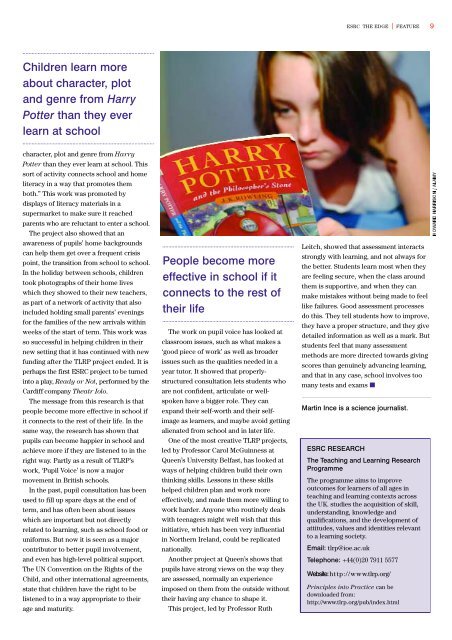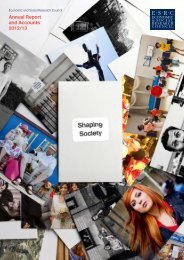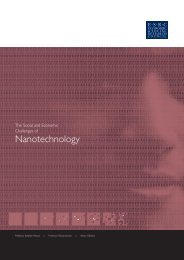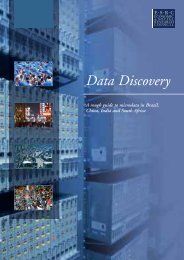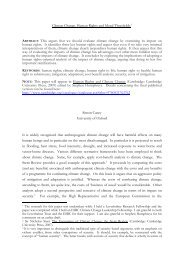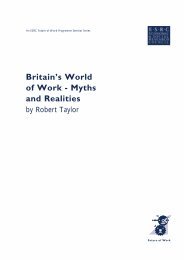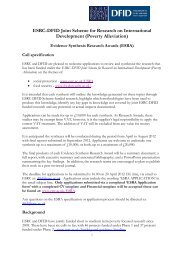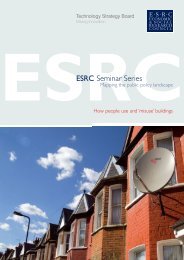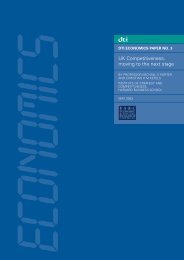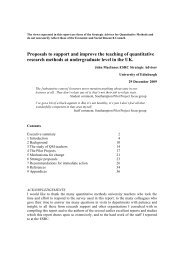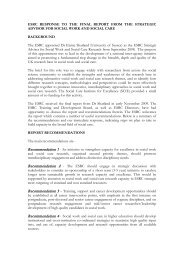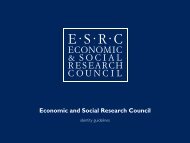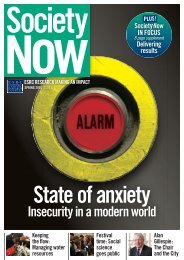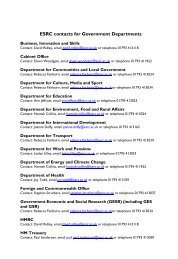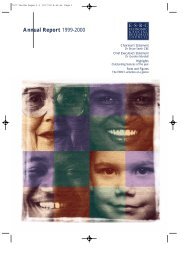Issue 26 - November 2007 (PDF, 1.69Mb) - ESRC
Issue 26 - November 2007 (PDF, 1.69Mb) - ESRC
Issue 26 - November 2007 (PDF, 1.69Mb) - ESRC
Create successful ePaper yourself
Turn your PDF publications into a flip-book with our unique Google optimized e-Paper software.
Children learn more<br />
about character, plot<br />
and genre from Harry<br />
Potter than they ever<br />
learn at school<br />
character, plot and genre from Harry<br />
Potter than they ever learn at school. This<br />
sort of activity connects school and home<br />
literacy in a way that promotes them<br />
both.” This work was promoted by<br />
displays of literacy materials in a<br />
supermarket to make sure it reached<br />
parents who are reluctant to enter a school.<br />
The project also showed that an<br />
awareness of pupils’ home backgrounds<br />
can help them get over a frequent crisis<br />
point, the transition from school to school.<br />
In the holiday between schools, children<br />
took photographs of their home lives<br />
which they showed to their new teachers,<br />
as part of a network of activity that also<br />
included holding small parents’ evenings<br />
for the families of the new arrivals within<br />
weeks of the start of term. This work was<br />
so successful in helping children in their<br />
new setting that it has continued with new<br />
funding after the TLRP project ended. It is<br />
perhaps the first <strong>ESRC</strong> project to be turned<br />
into a play, Ready or Not, performed by the<br />
Cardiff company Theatr Iolo.<br />
The message from this research is that<br />
people become more effective in school if<br />
it connects to the rest of their life. In the<br />
same way, the research has shown that<br />
pupils can become happier in school and<br />
achieve more if they are listened to in the<br />
right way. Partly as a result of TLRP’s<br />
work, ‘Pupil Voice’ is now a major<br />
movement in British schools.<br />
In the past, pupil consultation has been<br />
used to fill up spare days at the end of<br />
term, and has often been about issues<br />
which are important but not directly<br />
related to learning, such as school food or<br />
uniforms. But now it is seen as a major<br />
contributor to better pupil involvement,<br />
and even has high-level political support.<br />
The UN Convention on the Rights of the<br />
Child, and other international agreements,<br />
state that children have the right to be<br />
listened to in a way appropriate to their<br />
age and maturity.<br />
People become more<br />
effective in school if it<br />
connects to the rest of<br />
their life<br />
The work on pupil voice has looked at<br />
classroom issues, such as what makes a<br />
‘good piece of work’ as well as broader<br />
issues such as the qualities needed in a<br />
year tutor. It showed that properlystructured<br />
consultation lets students who<br />
are not confident, articulate or wellspoken<br />
have a bigger role. They can<br />
expand their self-worth and their selfimage<br />
as learners, and maybe avoid getting<br />
alienated from school and in later life.<br />
One of the most creative TLRP projects,<br />
led by Professor Carol McGuinness at<br />
Queen’s University Belfast, has looked at<br />
ways of helping children build their own<br />
thinking skills. Lessons in these skills<br />
helped children plan and work more<br />
effectively, and made them more willing to<br />
work harder. Anyone who routinely deals<br />
with teenagers might well wish that this<br />
initiative, which has been very influential<br />
in Northern Ireland, could be replicated<br />
nationally.<br />
Another project at Queen’s shows that<br />
pupils have strong views on the way they<br />
are assessed, normally an experience<br />
imposed on them from the outside without<br />
their having any chance to shape it.<br />
This project, led by Professor Ruth<br />
E S R C T H E E D G E | F E AT U R E<br />
Leitch, showed that assessment interacts<br />
strongly with learning, and not always for<br />
the better. Students learn most when they<br />
are feeling secure, when the class around<br />
them is supportive, and when they can<br />
make mistakes without being made to feel<br />
like failures. Good assessment processes<br />
do this. They tell students how to improve,<br />
they have a proper structure, and they give<br />
detailed information as well as a mark. But<br />
students feel that many assessment<br />
methods are more directed towards giving<br />
scores than genuinely advancing learning,<br />
and that in any case, school involves too<br />
many tests and exams<br />
Martin Ince is a science journalist.<br />
<strong>ESRC</strong> RESEARCH<br />
The Teaching and Learning Research<br />
Programme<br />
The programme aims to improve<br />
outcomes for learners of all ages in<br />
teaching and learning contexts across<br />
the UK. studies the acquisition of skill,<br />
understanding, knowledge and<br />
qualifications, and the development of<br />
attitudes, values and identities relevant<br />
to a learning society.<br />
Email: tlrp@ioe.ac.uk<br />
Telephone: +44(0)20 7911 5577<br />
Website: h t t p : / / w w w. t l r p . o r g /<br />
Principles into Practice can be<br />
downloaded from:<br />
http://www.tlrp.org/pub/index.html<br />
9


